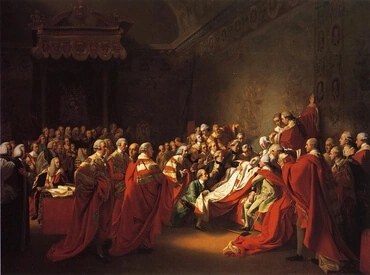1
A ovo su zakoni koje ćeš im postaviti:
2
Ako kupiš roba Jevrejina, šest godina neka ti služi, a sedme nek otide slobodan bez otkupa.
3
Ako bude došao inokosan, neka i otide inokosan; ako li bude imao ženu, neka ide i žena s njim.
4
Ako ga gospodar njegov oženi, i žena mu rodi sinove ili kćeri, žena s decom svojom neka bude gospodaru njegovom, a on neka otide sam.
5
Ako li rob reče tvrdo: Ljubim gospodara svog, ženu svoju i decu svoju, neću da idem da budem slobodan,
6
Onda neka ga dovede gospodar njegov pred sudije i postavi na vratima ili kod dovratka, i onde neka mu gospodar probuši uho šilom, pa neka mu robuje doveka.
7
Ako ko proda kćer svoju da bude robinja, da ne odlazi kao robovi što odlaze.
8
Ako ne bude po volji gospodaru svom, i on je ne uzme za ženu, neka je pusti na otkupe; ali da nema vlasti prodati je u tuđ narod učinivši joj neveru.
9
Ako li je zaruči sinu svom, da joj učini po pravu koje imaju kćeri.
10
Ako li uzme drugu, da joj ne umali hrane ni odela ni zajednice.
11
Ako joj ovo troje ne učini, onda nek otide bez otkupa.
12
Ko udari čoveka, te umre, da se pogubi.
13
Ako li ne bude hteo, nego mu ga Bog dade u ruke, odrediću ti mesto kuda može pobeći.
14
Ako bi ko namerno ustao na bližnjeg svog da ga ubije iz prevare, odvuci ga i od oltara mog da se pogubi.
15
Ko udari oca svog ili mater svoju, da se pogubi.
16
Ko ukrade čoveka i proda ili se nađe u njegovim rukama, da se pogubi.
17
Ko opsuje oca svog ili mater svoju, da se pogubi.
18
Kad se svade ljudi, pa jedan udari drugog kamenom ili pesnicom, ali onaj ne umre nego padne u postelju,
19
Ako se pridigne i izađe o štapu, da ne bude kriv onaj koji je udario, samo dangubu da mu naknadi i svu vidarinu da plati.
20
Ko udari roba svog ili robinju štapom tako da mu umre pod rukom, da je kriv;
21
Ali ako preživi dan ili dva, da nije kriv, jer je njegov novac.
22
Kad se svade ljudi, pa koji od njih udari trudnu ženu tako da izađe iz nje dete, ali se ne dogodi smrt, da plati globu koliko muž ženin reče, a da plati preko sudija;
23
Ako li se dogodi smrt, tada ćeš uzeti život za život,
24
Oko za Oko, zub za zub, ruku za ruku, nogu za nogu,
25
Užeg za užeg, ranu za ranu, modricu za modricu.
26
Ako ko udari po oku roba svog ili robinju svoju, te mu pokvari oko, da ga otpusti slobodnog za oko njegovo.
27
I ako izbije zub robu svom ili robinji svojoj, da ga pusti slobodnog za zub njegov.
28
Ako vo ubode čoveka ili ženu, te umre, da se vo zaspe kamenjem i da se ne jede meso od njega, a gospodar od vola da nije kriv.
29
Ali ako je vo pre bio bodač i gospodar njegov znao za to pa ga nije čuvao, te ubije čoveka ili ženu, vo da se zaspe kamenjem, i gospodar njegov da se pogubi.
30
Ako mu se odredi da se otkupi, neka da otkup za život svoj, koliko mu se odredi.
31
Ako ubode sina ili kćer, da mu bude po istom zakonu.
32
Ako li roba ubode vo ili robinju, da da gospodaru njihovom trideset sikala srebra i vo da se zaspe kamenjem.
33
Ako ko otkrije jamu ili iskopa jamu a ne pokrije, pa upadne vo ili magarac,
34
Da naknadi gospodar od jame i plati novcem gospodaru njihovom, a što je uginulo da je njegovo.
35
Ako vo jednog ubode vola drugom, te pogine, onda da prodadu vola živog i novce da podele, tako i ubijenog vola da podele.
36
Ako li se znalo da je vo pre bio bodač pa ga nije čuvao gospodar njegov, da da vola za vola, a ubijeni neka bude njemu.







